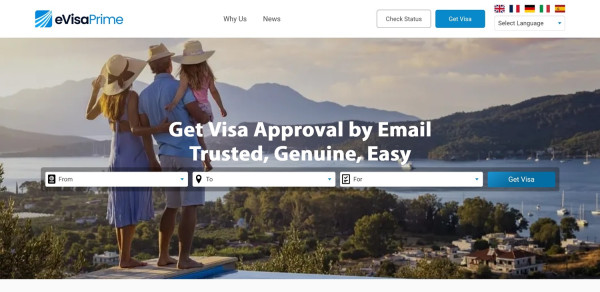Press release
Vietnam Evisa Common Mistakes And How To Avoid Them
- By Grand News Network
- June 28, 2024

Evisa Online
The goal of the E-Visa system is to streamline bureaucratic processes for travelers and offer a different option to visas obtained at border crossings. An eVisa functions as an electronic substitute for a standard visa stamp. Individuals have the option to apply for visas to their preferred travel locations using online forms. People who are thinking about applying for a visa can obtain their travel papers by meeting the requirements on the e-visa website. Online visas are primarily granted for purposes related to tourism visits. This system has not been utilized for handling work permits or student visas. Your electronic visa is digitally linked to your passport, as opposed to being stamped or stickered. On certain occasions, you may need to present either a physical or electronic version of your eVisa when arriving at your destination. Travelers will be required to provide their passport details, email address, and debit or credit card information in order to successfully submit the India e-Visa Application Form.
Documents Required for the e-Visa
- A Valid passport valid for at least 6 months.
- Passport-style photo of the applicant.
- A valid Email address to receive the E-Visa in their Inbox.
- You can use a Credit or debit card to pay for the eVisa fees.
Common Mistake To Avoid On Vietnam Evisa Application
- Another frequent error is giving inaccurate or inadequate personal details on the eVisa application form. Even a minor error or oversight could lead to your application being denied or facing interruptions. Verifying all the information provided is crucial, including your full name, date of birth, passport details, and contact information.
- Make sure that your passport photo and portrait are unedited, up to date (taken in the past 6 months) and adhering to the specifications for size and format (under 2MB, in either JPG or PNG format). Refrain from wearing glasses, tank tops, or cropping the image on your passport page.
- Verify your full name for errors in spelling and spacing to ensure it matches the ICAO line in your passport. Ensure accuracy of all passport details and utilize proper date format (DD/MM/YYYY).
- Misunderstanding the validity period of your eVisa can lead to overstaying, so make sure to check the visa expiration date.
- Neglecting to request eVisa for accompanying children: Each traveler, including kids, needs to submit their own eVisa application. If your children possess their own passports, they must also obtain an individual visa just like the adults. Some parents are unaware of this information, so they include their children's names on the visa application even if the children have their own passport.
- Track your application status online to promptly resolve any issues. Because the process is online, applicants might assume that the outcome will be sent to the email they provided automatically. Or maybe they are simply not familiar with the status check feature available on the website. Following 3 working days, it is necessary for you to visit the Vietnam Immigration Department website yourself to verify the status of your application.
India Introduces A New Category Of Visa
A visa is generally a form of authorization for travel provided by a country to allow legal entry into the country. Various types of visas are available for different purposes like tourism, employment, education, transit, immigration, etc. India's Ministry of Home Affairs has unveiled a new visa category known as Ayush (AY) visa to highlight its dedication to traditional healing and wellness traditions. This visa is designed specifically for foreign individuals seeking treatment with Ayush and Indian medicine systems. India introduced a new visa called Ayush Visa (AY) for foreigners who want to access treatment under the AYUSH system in India. This visa is intended for individuals interested in Ayurveda, Yoga, and other traditional healing methods for well-being. Ayush embodies the ancient Indian healthcare system consisting of Ayurveda, Yoga, Naturopathy, Unani, Siddha, and Homeopathy, which has been practiced for many years. The Ayush visa is divided into two sub-categories. A patient visa is for someone going to receive medical treatments, while an Attender Visa is for someone accompanying the patient. The Ayush (AY-1) visa is designed for foreign individuals seeking medical treatment in the Indian Ayush system, which includes Ayurveda, Yoga, Naturopathy, Unani, Siddha, and Homeopathy. An AY-2 visa will be given to the Ayush attendant. The Ayush Visa is available in two options: offline as Regular Paper Visa or online as e-visa. This new endeavor seeks to enhance the medical significance in India and fulfill the goal of promoting traditional Indian medicine on a global scale. The Ayush Union Ministry secretary has stated that the Indian government's travel rules do not affect foreign nationals seeking Ayurvedic treatments from accredited health facilities on a medical visa. Those who qualify for medical treatment can fill out the application by giving important information such as their name, birthdate, birthplace, address, contact details, and passport information.
REQUIREMENTS FOR MEDICAL VISA FOR INDIA
- Applicants must have a passport issued by an eligible country to obtain the India e-Medical visa. This passport must be valid for a minimum of 6 months from the date the traveler intends to arrive in the country.
- In addition, foreign nationals must provide a letter from the hospital in India where they will receive treatment.
- Proof that they have the funds to cover their stay.
- They must also have a return or onward ticket when applying.
- A valid email address to receive the E-visa.
- You can use a Credit/debit card or PayPal account to pay for the Medical E-Visa fees.
Indian E Visa Document Requirements
People from 169 countries are now eligible to apply for E-Visas in order to travel to India. This efficient process will streamline the visa application for many travelers visiting India. The goal of the India e-Visa is to simplify the visa application procedure and boost the influx of foreign tourists to the country. India acknowledges that e-visas are a valid way for eligible tourists to travel to the country. Traveling to India requires a valid India e-Visa. Individuals can choose to visit India for business, tourism, or medical reasons by obtaining an electronic visa for India. Completing the India e-Visa Application is straightforward. Travelers will be required to provide their passport details, email address, and debit or credit card information in order to successfully submit the India e-Visa Application Form.
Types of India-Visas
- India e-Tourist Visa
- India e-Business Visa
- Medical e-Visa for India
- India Medical Attendant e-Visa
Documents Required for the Indian e-Visa
- A Valid passport valid for at least 6 months on the expected date of arrival in India.
- Passport-style photo of the applicant
- A valid Email address to receive the Indian E-Visa in their Inbox.
- You can use a Credit or debit card to pay for the eVisa fees.
India Visa Photo Requirements
- The size of the needed Indian visa photo is 22 inches.
- The image must be in color.
- The background of the photograph must be plain and light.
- Only clear, blur-free images are permitted.
- Your head height should be between 1 and 1.375 inches. In general, it should be around 1.3 inches.
- The top of the torso should be visible.
- Look directly into the camera when photography. Lowering your eyes is not permitted.
Media Contact
Organization: Evisaprime
Contact Person: James Charleton Frederick
Website: https://www.evisaprime.com/
Email: Send Email
Country:United States
Release id:13642
The post Vietnam Evisa Common Mistakes And How To Avoid Them appeared first on King Newswire. It is provided by a third-party content provider. King Newswire makes no warranties or representations in connection with it.
Disclaimer: The views, recommendations, and opinions expressed in this content belong solely to the third-party experts. This site was not involved in the writing and production of this article.

